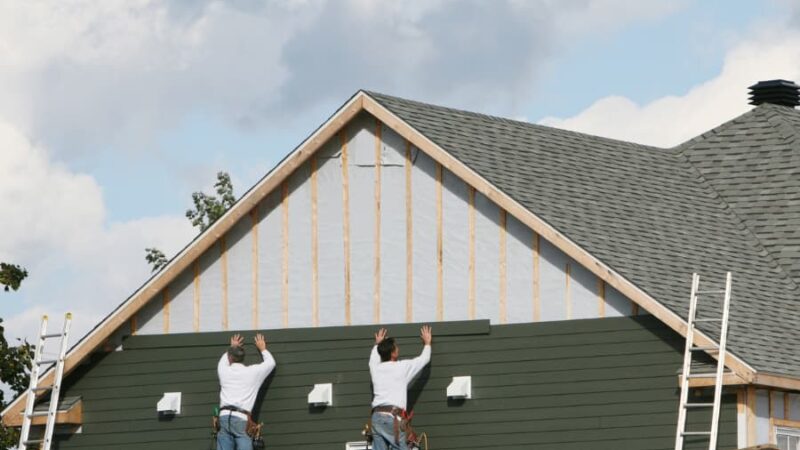
Replacing your house siding is a big investment. While necessary, it isn’t a step you want to take lightly. Some siding materials last longer than others, and proper maintenance can keep your siding in good condition and extend its lifespan.
New Jersey Siding & Windows, Inc., is a trusted provider of replacement siding and other home improvement services in northern New Jersey. Here, we discuss how often house siding should be replaced and ways to extend your siding’s longevity.
Signs It’s Time to Replace Your Siding
The best way to know when to replace siding is simply by checking. Many signs of siding damage and deterioration are visible or have noticeable tells. If your siding is getting old, check over your house. Here are some signs it may be time for a replacement:
- There are noticeable cracks, warping, or rot.
- Visible bubbling or blisters indicate water trapped behind the siding.
- Large quantities of mold or mildew are growing on your siding, especially near the seams.
- Paint is peeling inside your home, caused by moisture penetration.
- Your siding is severely faded or discolored.
- Your heating and cooling bills are higher than they should be.
When you notice something wrong with your siding, trust your instinct. It may be time to order a replacement. You can contact New Jersey Siding & Windows, Inc., for a professional assessment if you aren’t certain. Experienced advice will help you make the best decision for your home and budget.
How Long Does Siding Last?
An appropriate siding replacement cycle depends, in part, on environmental conditions. Severe weather, inadequate maintenance, and intense exposure to moisture or UV light may cause your house siding to break down sooner. Damage also plays a part. Falling tree branches, animals, gale winds, and other events may impact sections of siding at any time, prompting an immediate replacement.
In general, however, the projected lifespan of house siding depends on its construction. Different materials are more durable against weather conditions than others. They also differ in maintenance requirements, which may have an additional impact on your siding’s longevity.
Vinyl
Vinyl is among the most popular siding materials. Relatively durable, it lasts 30 to 40 years before needing replacement. In addition, new siding installation is comparatively simple and affordable. Vinyl siding is also mold- and rot-resistant and simple to clean with a hose or soapy cloth. Low maintenance requirements make it easy for homeowners to get more years out of their investment.
Fiber Cement
Fiber cement is made of a mixture of wood pulp and cement, resulting in a sturdy material that lasts 25 to 30 years and remains durable even in harsh weather. Installing fiber cement siding is labor-intensive and may be more expensive when compared with vinyl. When the time comes for replacement, you’ll face higher costs and a lengthier process.
Cellular PVC/Composite
In recent years, cellular PVC and composite siding, composed of a mixture of PVC and other materials, or engineered wood siding, had become an increasingly popular alternative to vinyl and fiber cement siding. The construction of these materials make them extremely durable, while providing the premium look many homeowners are looking for these days.
Aluminum
The predecessor to vinyl siding, aluminum siding was a popular choice throughout the 60s into the 90s, providing homeowners with a rot proof option for their homes. Susceptible to denting and requiring paint, this style has fallen out of favor in recent years, replaced in the industry by vinyl siding.H3: Wood
Wood, meanwhile, is short-lived. Though the natural material delivers an attractive traditional aesthetic, it’s also highly prone to pests, moisture damage, and mold. Wood siding typically lasts only 15 to 30 years, even if well-maintained. It’s also high effort. Throughout your siding’s lifespan, you’ll be working hard to keep it at peak appearance and performance.
Extending the Lifespan of Your Siding
Regardless of material, house siding lasts the longest if it’s maintained. Here are some tips for keeping your siding in good condition for years of added value:
- Clean your siding annually or when it gets dirty. Use gentle cleaners, soft scrub brushes, and a standard garden hose. Avoid harsh chemicals and pressure washers.
- Inspect your siding regularly for signs of damage. Pay special attention to the seams, around windows, doors, and the corners of your home.
- Keep your gutters clean and in good condition. Working gutters will direct rainwater away from your home, protecting your siding against moisture damage.
- Be mindful of plants that may grow into your siding. Don’t plant them near your home and keep them trimmed to avoid intrusion.
No house siding will last forever. With proper care, however, you can make sure yours reaches the upper end of its projected lifespan and only needs replacement when you’re ready for it.
Call Us If It Is Time to Replace Your House Siding
Of course, even durable siding with excellent maintenance will break down eventually. When it does, trust New Jersey Siding & Windows, Inc., with your replacement. We are a family-owned company with over 20 years of experience serving northern New Jersey. Our premium products are sourced from top manufacturers, ensuring their longevity. Contact us to learn more or to request a free quote.

